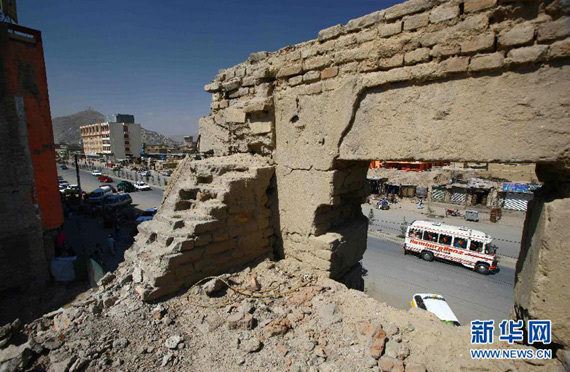Stabilizing Afghanistan calls for the involvement of regional powers
- By Sumantra Maitra
 0 Comment(s)
0 Comment(s) Print
Print E-mail China.org.cn, April 29, 2018
E-mail China.org.cn, April 29, 2018

Afghan capital Kabul [Photo/Xinhua]
In the run up to Soviet intervention in Afghanistan in 1979, the politburo met to discuss whether the time was right to send in troops or whether to simply help the Afghan government with funds and weapons to deal with their problems the way they were supposed to be dealt with. There were realists in the Soviet administration who were skeptical of an invasion, and confident that the Soviets wouldn't be able to come out of Afghanistan that easily. Unfortunately, they didn't prevail – and the rest, as they say, is history. The Soviet Union went bankrupt, and lost over 15,000 lives, trying to stabilize Afghanistan.
As I read news of ISIS blowing up 50 random people in an election sector in Kabul, I remember this archival history. The war and counter-insurgency in Afghanistan have been going on since 2001, but the writ of the government lies only in Kabul and some other urban centers. The Taliban is growing and is at its strongest since 2004, when major U.S. forces started to be diverted to the Middle East. And the domestic government is as weak as ever. Since 2001, the U.S. has spent over 500 billion dollars annually, trying to stabilize Afghanistan.
But the plan was wrong from the start. The regional great powers like India, Pakistan and Iran have their own security interests, which are divergent and often confrontational. The U.S. also relied on the heavy-handed promotion of democracy, trying to establish foreign norms in a society which remains deeply tribal and sectarian. They also disbanded all militias which were based on sectarian loyalties, and which were intrinsic in stabilizing parts of the country; and that, especially, has been a major disaster. These militias and local tribes, which have their own cultures and norms, and are led by people they deeply care about, are loyal to their own. The idea of modern representative democracy is alien in these places, and as such, it is baffling to attempt promote modern norms by external forces. But with these tribes and forces neutered, the only forces which command loyalty are based either on ethnicity, like the Taliban, or on religion, like ISIS.
Recent research points to a completely different method, which is unfortunately ignored by the West. The research suggests not to force norms, but rather to encourage local leaders to stabilize and promote order, in whichever means necessary. In simpler words, sometimes external powers should focus on stability, rather than values, and promote order over chaos. That would lead to a stable country, and would in turn naturally help further development. A contrasting example is Chinese investment in Africa, which does not force African governments to adhere to Chinese social culture.
The situation in Afghanistan is tricky. It remains a graveyard of empires, having led to overreach by the Persians, the Mughals, the British, the Soviets and now the Americans. It is important to understand that local leaders have a huge stake in the stability of the region. It is also important to understand that the United States won't be there for long. The local actors know that, and in a waiting game, the external power will always lose. American taxpayers cannot afford to continue to fund Afghanistan as a province whose governance is borne solely by the United States.
The Indian Prime Minister Modi is about to meet with President Xi. As per Indian strategic circles, PM Modi wants to display that China and India have overlapping interests in South Asia, the Indian Ocean and the Indo-Pacific and that there is "an urgency to align our world views through a broader across-the-board dialogue." I cannot think of a better idea than discussing the inevitable prospect of a post-American Afghanistan, which is a factor of immense importance to both India and China, not just for security and terrorism issues, but also economic issues. Stabilizing Afghanistan calls for a new approach, most importantly the cooperation of the regional giants.
Sumantra Maitra is a columnist with China.org.cn. For more information please visit:
http://www.ccgp-fushun.com/opinion/SumantraMaitra.htm
Opinion articles reflect the views of their authors only, not necessarily those of China.org.cn.





